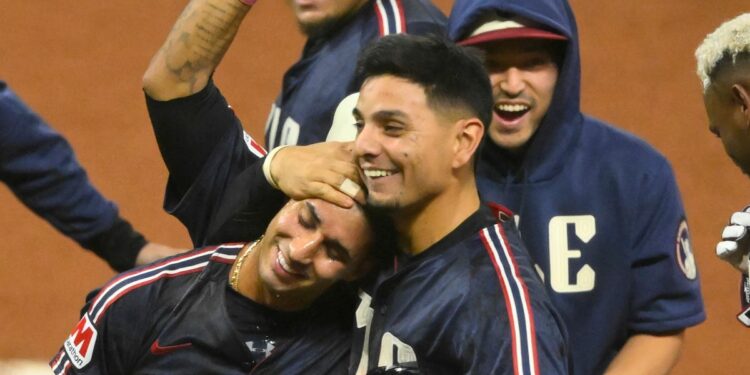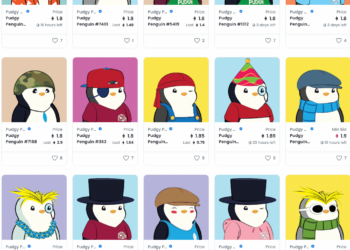Cleveland Guardians second baseman Andrés Giménez deeply missed Venezuela when he came to America to pursue his baseball dreams.
But as soon as he got to Cleveland, he said, he was welcomed with open arms by the organization and its fans.
“They made me feel comfortable the first day I got here,” Giménez said. “They take care of your family. They want to get to know them and see what they do in their free time. If your family is taken care of, it makes you worry less.”
National Hispanic Heritage Month started Sept. 15 and continues through Oct. 16.
In honor of the monthlong celebration, we spoke with six Cleveland Guardians players from Central and South American countries about their favorite things from their homeland, as well as their feelings about their new adopted home in Northeast Ohio.
Here’s what they had to say.
‘Los tres chamos:’ ‘The three homeboys’ talk about life in Venezuela
Like Giménez, shortstop Brayan Rocchio and pitcher Pedro Avila were born and raised in Venezuela. Rocchio and Avila are from Caracas, the capital of the country, and Giménez is from Barquisimeto, a city in the center of the country.
Rocchio’s favorite time to go back to his country is during Christmas.
“My country brings me peace,” Rocchio said. “I can go to the beach, and I have my family there. We eat good food during the holidays.”
Rocchio’s favorite traditional dishes are pabellón criollo (shredded meat with fried onions, garlic and bell pepper) and hallaca (cornmeal dough filled with chicken or beef wrapped with veggies in a banana leaf).
For the country’s Independence Day on July 5, people have off days from work. During that free time, they typically are at home surrounded by family, something Avila enjoys. His favorite food is his mother’s and grandmother’s cooking.
He said Venezuelan people are happy people.
“They just love life, the way they talk and treat you,” Avila said.
The traditions for Giménez are a tad bit different in his hometown, especially when it comes to food.
“We have the traditional dishes, but my favorite type of food is street food,” he said. “We have a dish from my city called pepito (a sandwich that can be made with steak, chicken, or pork that includes mayo, tomatoes, lettuce and small chips. I like it a lot.”
Giménez said he loves being in Venezuela, where the vibes are like nowhere else.
“I just love being there,” Giménez said. “Regardless of what may be going on in the country, people remain positive and full of energy still.”
Venezuelan phrases you may hear them say: “Chamo/Chama” (slang term for someone you know like a friend), “Naguara” (can have many meanings depending on the context, but it’s a form of expression such as wow), “Arrechera” (bothered or mad).Traditional Venezuelan music: Joropo (consists of guitars and cellos, maracas, very fast-paced rhythms) and Raspacanilla (various Caribbean-inspired rhythms, common in Giménez’s hometown).¿Qué lo qué bro?: ‘What’s up bro?’ Dominican Republic natives share details about home
Four Guardians players are from the Caribbean nation of Dominican Republic: pitcher Emmanuel Clase, third baseman José Ramírez, center fielder Angel Martínez and right fielder Jhonkensy Noel.
Clase was born in the northern part of the island nation in Rio San Juan. Ramírez is from the southern part of the Dominican Republic, Bani, as are Martínez (Santo Domingo) and Noel (San Pedro de Macoris).
“We have the best food and culture,” Noel said.
A traditional dish is sancocho, which is a multi-meat soup that includes potatoes, vegetables, corn, rice and avocado.
“I love it because it’s a dish you can share with everyone even when times aren’t the best,” Noel said.
Martínez said other dishes include arroz (rice), habichuela (beans) con carne (with meat) and tres golpes (a typical breakfast dish that includes fried salami, plantains, fried cheese, eggs, onions and avocados).
“I definitely miss my country’s food, my family and the vibes,” Martínez said.
“My people always have the best energy and vibes,” he added. ‘We’re always celebrating.”
Noel said the love for the island goes beyond just native Dominicans.
“You see Americans in our country all the time,” Noel said. “They love to vacation there.”
Dominican phrases you may hear them say: “Baina/Vaina” (Something), “¿Qué lo qué?” (What’s up?)Traditional Dominican music: Salsa, dembow (reggaeton/latin rap; some of their walk-up songs are this type of music) and Bachata (slower pace rhythms, very popular dance-style music).What makes the Cleveland Guardians organization so special for international players?
For Rocchio, the moment he was drafted to the Guardians, he said the organization always respected him.
“They gave me the opportunity to play,” Rocchio said. “I really like how they treat people.”
Avila said what makes the organization special is the energy in the clubhouse.
“When you step foot in the clubhouse, it’s the culture in here,” Avila said. “Even if you have a bad or good day, people come in here with great attitudes.”
Noel said the Guardians really make players feel like they are back in their home countries.
“They always want you to feel comfortable,” Noel said. “It’s something all of us seek.”
Martínez said having players in the clubhouse such as Clase, Ramírez and Noel who also are Dominican helps a lot.
“I played with some of them in the minor leagues, so being that I already knew them, they’re family,” Martinez said. “The organization always treated me well when I first got here.”
And for Ramírez, Cleveland is his home.
“All my kids were born here,” he said. “They love it. I love it. The fans treat me like I am one of them — and I am.”
Source link : http://www.bing.com/news/apiclick.aspx?ref=FexRss&aid=&tid=66fdb1f36e1144afb8df2e3fcab96f94&url=https%3A%2F%2Fwww.usatoday.com%2Fstory%2Fsports%2Fmlb%2Fcleveland-guardians%2F2024%2F10%2F02%2Fcleveland-guardians-playoffs-mlb-hispanic-players-andres-gimenez-brayan-rocchio-venezuela%2F75383076007%2F&c=2758937894789592434&mkt=en-us
Author :
Publish date : 2024-10-02 07:55:00
Copyright for syndicated content belongs to the linked Source.








